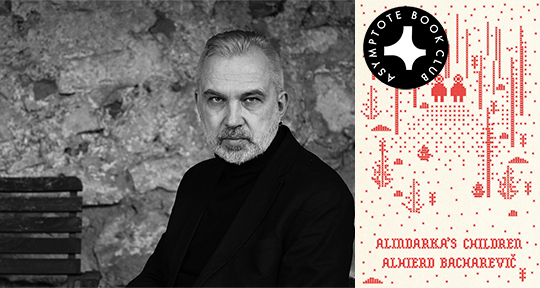A contemporary fable for the linguistic and cultural conflicts of post-Soviet Belarus, wherein the Belarusian language is at risk of being overwhelmed by the dominant Russian, Alherd Bakharevich’s Alindarka’s Children is a poignant and disturbing look into the myriad consequences of language suppression. Translated into both English and Scots, this multilingual novel is a vital testament to both the necessities and moral ambiguities of preservation, and a fascinating investigation of the intricate networks between expression and communication, adulthood and childhood, the public and the private.
The Asymptote Book Club aspires to bring the best in translated fiction every month to readers around the world. You can sign up to receive next month’s selection on our website for as little as USD15 per book; once you’re a member, join our Facebook group for exclusive book club discussions and receive invitations to our members-only Zoom interviews with the author or the translator of each title.
Alindarka’s Children by Alherd Bacharevič, translated from the Belarusian by Petra Reid and Jim Dingley, New Directions, 2022
Alindarka’s Children is Alherd Bakharevich’s clever reworking of a classic parable, using a simple Hansel and Gretel-like premise to grapple with real-life tensions between language and power in Belarus. Despite being written from the perspective of children, the novel plumbs deeply into the subtle darknesses and psychologies of Belarusian society. The novel begins with Alicia and her brother Avi, interned in a forested camp where children are trained to forget their language through a malefic system. The two are rescued by their proud and defiant father, but eventually slip away on an adventure of their own. As they explore the woods, encountering a series of memorable characters—interpreted from the original fairy tale and its confectionary-packet house—we are led to explore a world of anxiety and obsession, within which the duo must fend for themselves to survive.
Set in Belarus, the novel’s original Belarusian and Russian is brilliantly translated into both Scots and English, with colloquial Belarusian rendered into the former, and the main body of the book written in the latter. The dominant state-approved language, of which the camp is desperately trying to instill, is ‘the Lingo’—one can presume that it stands for Russian. ‘The Leid,’ or the Belarusian language, is left to slowly slip from collective memory, with Father attempting to impede its eradication by secretly speaking it to Alicia—or really ‘Sia.’ As a result, she remains silent at school, having been taught at home that the Lingo, too, is a forbidden language. READ MORE…

